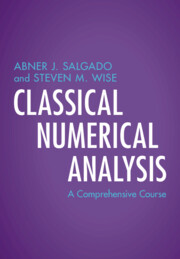Book contents
- Frontmatter
- Contents
- Preface
- Acknowledgements
- Symbols
- Part I Numerical Linear Algebra
- Part II Constructive Approximation Theory
- 9 Polynomial Interpolation
- 10 Minimax Polynomial Approximation
- 11 Polynomial Least Squares Approximation
- 12 Fourier Series
- 13 Trigonometric Interpolation and the Fast Fourier Transform
- 14 Numerical Quadrature
- Part III Nonlinear Equations and Optimization
- Part IV Initial Value Problems for Ordinary Differential Equations
- Part V Boundary and Initial Boundary Value Problems
- Appendix A Linear Algebra Review
- Appendix B Basic Analysis Review
- Appendix C Banach Fixed Point Theorem
- Appendix D A (Petting) Zoo of Function Spaces
- References
- Index
10 - Minimax Polynomial Approximation
from Part II - Constructive Approximation Theory
Published online by Cambridge University Press: 29 September 2022
- Frontmatter
- Contents
- Preface
- Acknowledgements
- Symbols
- Part I Numerical Linear Algebra
- Part II Constructive Approximation Theory
- 9 Polynomial Interpolation
- 10 Minimax Polynomial Approximation
- 11 Polynomial Least Squares Approximation
- 12 Fourier Series
- 13 Trigonometric Interpolation and the Fast Fourier Transform
- 14 Numerical Quadrature
- Part III Nonlinear Equations and Optimization
- Part IV Initial Value Problems for Ordinary Differential Equations
- Part V Boundary and Initial Boundary Value Problems
- Appendix A Linear Algebra Review
- Appendix B Basic Analysis Review
- Appendix C Banach Fixed Point Theorem
- Appendix D A (Petting) Zoo of Function Spaces
- References
- Index
Summary
In this chapter we begin the study of best approximations. In this case we study the best (min) polynomial approximation in the uniform (max) norm. The existence a best approximating polynomial is first presented. The more subtle issue of uniqueness is then discussed. To show uniqueness the celebrated de la Vallee Poussin, and Chebyshev equi-oscillation theorems are presented. A first error estimate is then presented. The problems of interpolation, discussed in the previous chapter, and best approximation are then related via the Lebesgue constant. Chebyshev polynomials are then introduced, and their most relevant properties presented. Interpolation at Chebyshev nodes, and the mitigation of the Runge phenomenon are then discussed. Finally; Bernstein polynomials; moduli of continuity and smoothness; are detailed in order to study Weierstrass approximation theorem.
Keywords
Information
- Type
- Chapter
- Information
- Classical Numerical AnalysisA Comprehensive Course, pp. 266 - 299Publisher: Cambridge University PressPrint publication year: 2022
